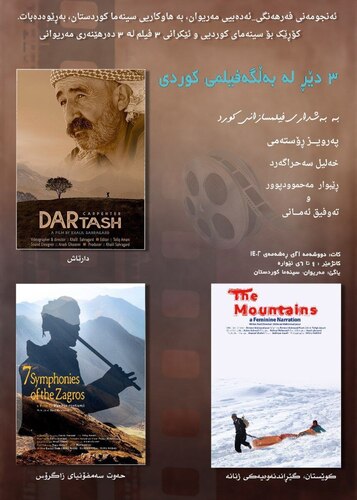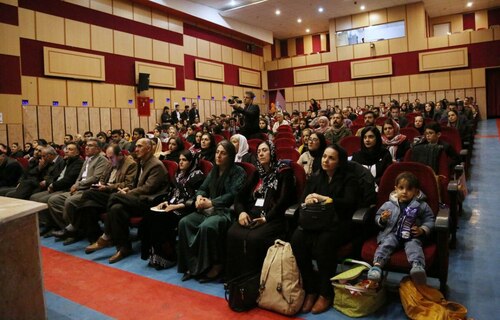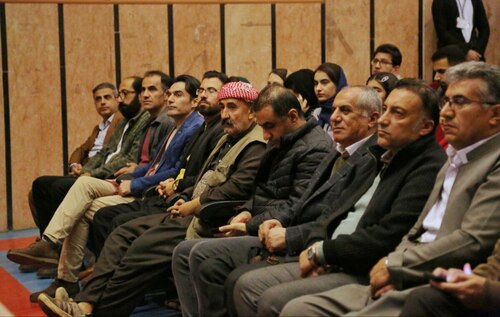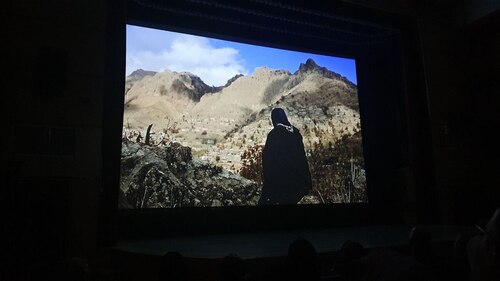
Kurdshop
Marivan Cultural and Literary Council in collaboration with Kurdistan Cinema organized a conference for Kurdish cinema and a screening of three new films by three directors from Marivan was held in "Kurdistan Cinema" of Marivan under the title of: "Three lines in Kurdish documentary film" for three films: 1- Seven Symphonies of Zagros, directed by Parviz Rostami, 2- Kwestan, a feminine narration, directed by Rebwar Mohammadpour, 3- Dartash, directed by Khalil Sahragard. Filmmakers and directors of these films as well as the famous editor of these films, Tofiq Amani, participated in the conference. A panel discussion was held with the participation of the directors and editor of these films and they discussed the films and the current situation of Kurdish cinema; then, by the Marivan Cultural and Literary Council and the director of Kurdistan cinema, Fatih Badparwa, these films' directors and producers were honored and presented with awards and certificates of appreciation. Finally, the films were screened.

Below is a summary of the panel:
In a part of his speech "Parviz Rostami", the famous Kurdish director said:
Documentary narratives have been more "realistic" in the past. That is, what the audience saw in the film was what the director and cameraman recorded. Then, they would write a story and a narrator would read it to the viewers. However, nowadays, documentary cinema has gained a different definition in the world in terms of both form and subject matter. If someone is going to make a documentary, in all areas of today's cinema they need experience, cinematic knowledge, and sociological literacy. One must be able to make a film with such cinematic literature that not only the Kurdish viewer could understand it but also a viewer who is not Kurdish and lives on the other side of the world should be able to watch it, feel a connection with it and understand what you have intended them to get. That is why, it is not easy to work in this field, especially, in today's world where thousands of films are made every year at home or abroad. When we see a Kurdish documentary wins first place among four or five thousand films in an international festival and wins the director's award or the best film award; it is a part of my job as a director or filmmaker. But what attracts the viewers' attention is the content and subject matter that has happened in geography like Kurdistan; as an identity, we are all culturally proud of it. Therefore, when a Kurdish film is successful or wins an award, it is fifty percent the work of the director or filmmaker, the other fifty percent is about what we see in the film. We are proud to see that Kurdish films are being screened in the world and are very popular among people. We need to be able to get familiar with the literature of cinema today, and in this way, we can discuss our problems, shortcomings, concerns of Kurdish society, and many other political and social issues in today's world and make them known in the world, and at least say our intentions by the means of cinema.

"Rebwar Mohammadpour", a filmmaker from Marivan, is the director of Kwestan, a feminine narrative, and talks about the problem of Kolbars (those men and women who carry cargo on their backs to transport them from one country to the other). In another part of the panel, he said:
Unfortunately, I believe that the phenomenon of Kolbari is more of a cultural poverty than an economic poverty; I hope it is resolved as soon as possible. What is interesting to me and I have mentioned it in my film is the impact of Kolbari on our society. What needs to be said is that we are not making these films to be chosen by festivals and shine and win awards and distinguish ourselves. I do not want to make my film while the Kolbars continue to do their tough job remaining in the mountains. Instead, I make films to impact my community and see my work as a cry and a step to eliminate Kolbari in Kurdistan. We Kurds, do not deserve to be Kolbars, and a day must come when this occupation disappears forever, and we must prevent the oppression of this section of the society, the Kolbars, by the wealthy and powerful class. I hope Kurdish cinema continues its work, if so, our people will live forever.
"Khalil Sahragard" the director of "Dartash" film said: my film is not only about mines and their damages to the people around the minefields but also an environmental film. However, when I visited the places where I had made the film, the old trees that were home to the squirrels had all been cut down, and the squirrels were gone. I felt very sad wondering why my people should damage the environment and nature like this. I hope we take a glance at ourselves and stop destroying our land and environment with our own hands.

In another part of the conference the filmmaker and editor, "Tofiq Amani", said:
One thing is really important for those who work in cinema and filmmaking, especially those who want to begin their work in the cinema; you know well that the Kurdish society and Kurdistan in general is full of social, cultural, and economic problems. We have problems in every area. We often use these subjects as a tool for making a film, it is very important that if we want to work on social, cultural, or traditional problems and whatever exists in our society, we try not to see only the dark aspects. We must try to keep the balance in our work. I am never in favor of developing a cinema that only criticizes society. Let us stop such a path. Let us see the beauties; this is also a type of cinema. But, if we want to criticize society in our works, let us have a balance, let us keep the blacks and whites together. This can have a greater impact on the audience, it also keeps us away from the closed-minded gaze that may enter our work and makes the audience feel like they need to oppose us. We must use cinema as a tool that is proven to be very useful in today's world influencing the viewers greatly. If we can influence the audience, we can introduce ourselves much better to the world. If we have any kind of social problems, our society should not be blamed generally.

For example, now that being Kolbar is discussed, we know that there is an attempt to identify Kurds as Kolbars; it is very important how we come to work on the issue of Kolbari, who wants to introduce us as Kolbars or laborers, we must not put all our focus on that matter. We must be a hope, and at the same time, we should show that we have a group of educated people who are going to work for the development of society to eliminate the ugly phenomenon of Kolbari. Kurdish cinema has made its place in the world. I can tell you that a specific file and platform has been opened for Kurdish cinema in many festivals around the world. Even when one decides to register and send their films to a platform, they can see that Kurdistan is mentioned as a country that you can choose and include your film in that part. In many festivals, they open a section called Kurdistan Cinema and Kurdish Cinema, and Kurdish films are screened there. That is why it is very important what we send to those festivals.










